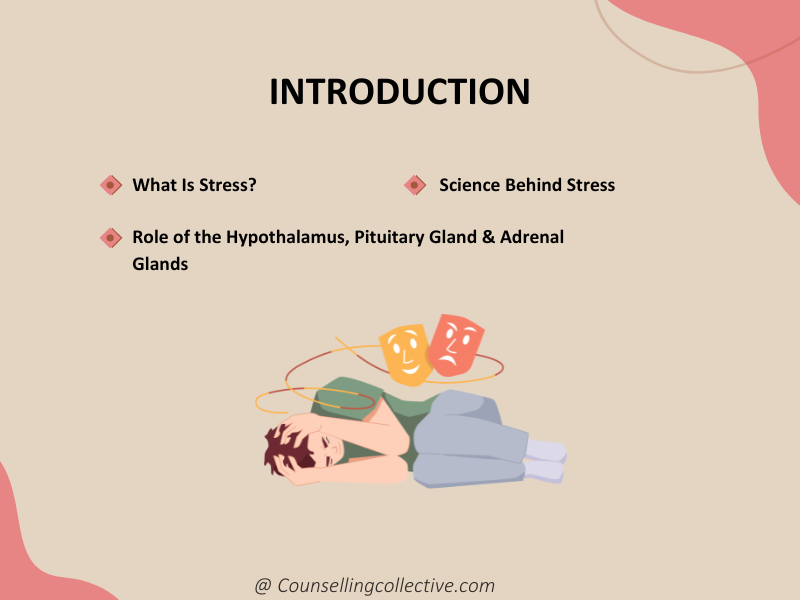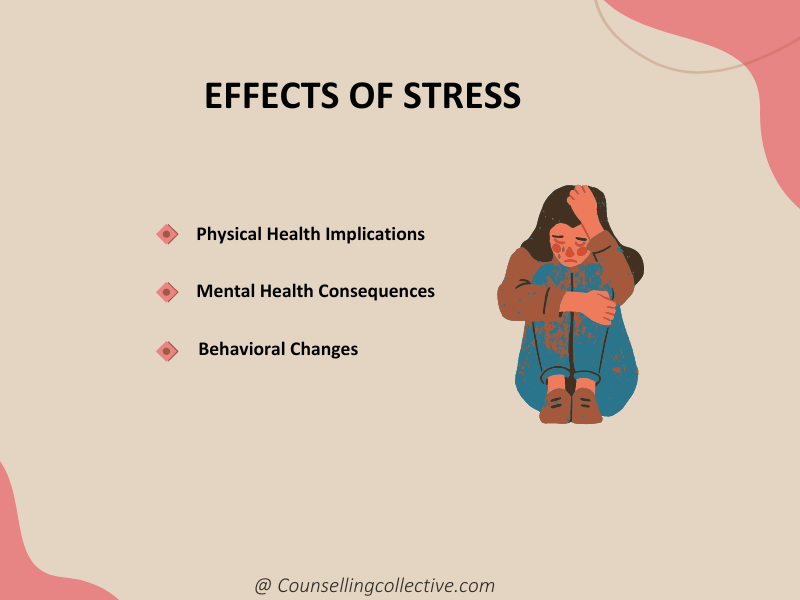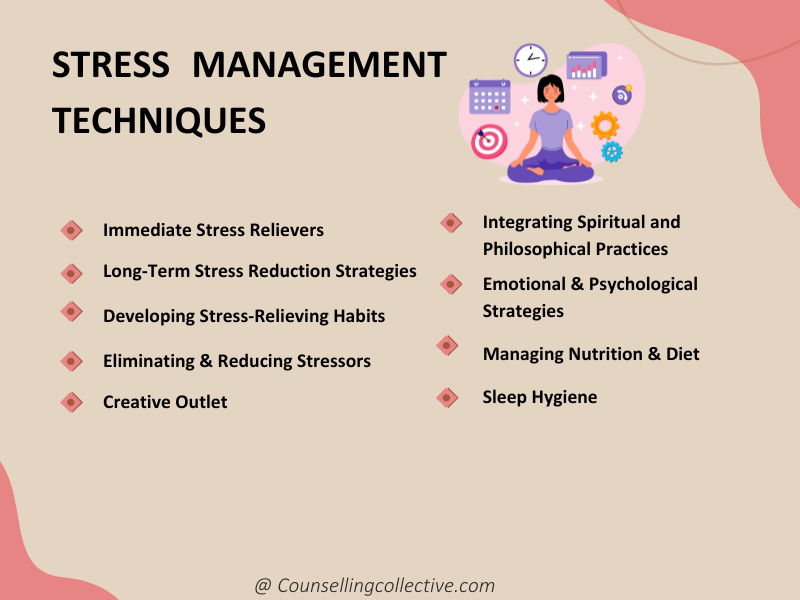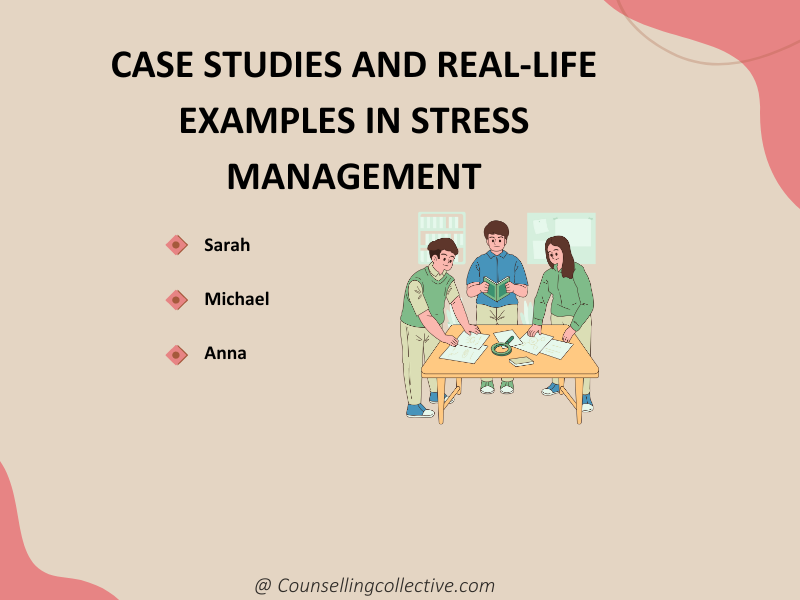Contents
Introduction
In today’s fast-paced world, stress has become an all-too-common companion for many. Whether it’s work deadlines, personal relationships, or financial pressures, stress can creep into every aspect of our lives.
Understanding and managing stress is not just important—it’s essential for maintaining our overall well-being. By recognizing the causes and effects of stress, we can take proactive steps to manage it effectively.
In this article, we will discuss the causes and effects of stress as techniques of stress management.

What is stress?

Stress is the body’s response to any demand or challenge (stressors) such as an environmental condition. It can be categorized into two types.
| Acute Stress | Chronic Stress |
| Short-term stress that arises from immediate challenges Example – Public speaking, traffic jams. Impact on the body – Increased heart rate, quick energy release | Long-term stress resulting from ongoing issues. Example – Persistent work pressure and long-term financial problems. Impact on the body – Cardiovascular issues, weakened immune system |
Science Behind Stress
The physiological stress response, known as the “fight or flight” response, involves the release of adrenaline and cortisol, preparing the body to face immediate threats.
While this response can be beneficial in short bursts, chronic stress can have detrimental effects on health, leading to conditions such as;
· Anxiety
· Depression
· Cardiovascular diseases
· Weakened immune function.
Role of the Hypothalamus, Pituitary Gland, and Adrenal Glands
The “fight or flight” response is orchestrated by a coordinated effort between the hypothalamus, pituitary gland, and adrenal glands, collectively known as the HPA axis.
Hypothalamus – This small but critical brain region acts as the command center. When a threat is perceived, the hypothalamus releases corticotropin-releasing hormone (CRH). CRH then signals the pituitary gland to take action.
Pituitary Gland – Often referred to as the master gland, the pituitary gland responds to CRH by secreting adrenocorticotropic hormone (ACTH) into the bloodstream. ACTH travels through the blood to the adrenal glands.
Adrenal Glands – Located atop the kidneys, the adrenal glands respond to ACTH by releasing cortisol, the primary stress hormone, and adrenaline (epinephrine). Cortisol increases glucose availability for immediate energy, while adrenaline boosts heart rate and energy levels.
This hormonal cascade ensures the body is ready to handle the stressor effectively. However, chronic activation of the HPA axis due to ongoing stress can lead to detrimental effects, such as impaired immune function, increased risk of chronic diseases, and mental health issues like anxiety and depression.
6 Sources Of Stress
Stress is an inevitable part of life, and understanding its sources can help us manage it better. Here’s a look at some of the most common causes of stress:
| Sources Of Stress | Description |
| Work-Related Stress | According to the Occupational Safety and Health Administration (OSHA), work is a significant[AK1] source of stress for many. Deadlines, an overwhelming workload, and job insecurity can create pressure. The fear of losing a job or not meeting expectations can create a stressful environment that affects overall well-being. |
| Personal Relationships | Our relationships greatly impact our stress levels. Conflicts with family members, friends, or partners can create emotional distress. Lack of support or understanding in these relationships can exacerbate feelings of loneliness and stress. Healthy communication and conflict resolution are essential in mitigating this type of stress. |
| Financial Stress | Money is a major stressor for many people. Financial stress arises from various situations such as debt, unexpected expenses, and the inability to meet basic needs. The anxiety of not having enough money can lead to sleepless nights and constant worry. |
| Health-Related Stress | Health-related stress is another common concern. Dealing with chronic illnesses, recovering from surgeries, or even worrying about potential health issues can be incredibly stressful. The fear and uncertainty associated with health problems can lead to anxiety and depression, further impacting one’s overall well-being. |
| Academic Stress | Academic stress often arises from the pressures of exams, tight deadlines, and high expectations from oneself and others. This type of stress can impact students’ mental and physical health, leading to anxiety, sleep disturbances, and burnout. Effective time management and support from teachers and peers are crucial for alleviating academic stress. |
| Environmental Stress | Environmental stress arises from factors in our surroundings, such as noise pollution, overcrowding, and poor living conditions. These stressors can significantly affect mental well-being and overall health, contributing to heightened anxiety and irritability. You can mitigate environmental stress by creating a more harmonious living space and seeking nature-based relaxation. |
A Brief History of Stress Management
The[AK3] concept of stress as a medical and psychological issue is relatively modern. This is a brief overview of how our understanding of stress and its management has evolved:
| Time Period | Stress and Management |
| Early 20th Century | Hans Selye introduced the concept of stress in biological and psychological contexts. Identified General Adaptation Syndrome (GAS): alarm, resistance, exhaustion. |
| The Great Depression Era | The economic crisis highlighted the impact on mental health. The need for psychological support and coping mechanisms became evident. Emergence of community support systems. |
| Post-World War II | Advances in understanding stress and trauma, especially PTSD. Development of stress management techniques like cognitive-behavioral therapy (CBT). |
| Modern Era | Multidisciplinary approach to stress management. Techniques include mindfulness meditation, relaxation exercises, yoga, physical activity, and lifestyle modifications. Stress management is recognized in various sectors. |
Effects of Stress
Stress impacts both physical and mental health in profound ways. Understanding these effects can help us recognize the importance of managing stress effectively.
Stress can affect physical and mental health. It also affects the behavior of humans. Let’s explore how stress affects our bodies and mind.
In this section, we will discuss about
Physical Health Implications
Mental Health Consequences
Behavioral changes

Physical Health Implications
Chronic stress has a detrimental impact on physical health. When the body is constantly under stress, it remains in a state of heightened alertness, which can strain the cardiovascular system. This can result in hypertension[AK2], or high blood pressure, and increase the risk of heart disease.
Additionally, stress suppresses the immune system, reducing its ability to fight off infections. This makes individuals more prone to illnesses and can slow the recovery process from sickness or injury.
Long-term stress can also lead to other health issues such as;
· Digestive problems
· Headaches
· Chronic pain.
Mental Health Consequences
The mental health effects of stress are equally concerning. Here are a few serious mental health consequences of stress.
· Prolonged stress is a significant contributor to anxiety and depression. When stressed, the brain releases hormones that can alter mood and emotions, leading to overwhelming and sad feelings.
· Stress also impairs cognitive functioning. It can affect memory, making it difficult to retain information or recall past events.
· Decision-making skills can also be compromised under stress, as the ability to think clearly and logically is hindered. This can lead to poor choices and increased anxiety about the outcomes of those choices.
Behavioral Changes
Stress often leads to noticeable changes in behavior. One of the most common effects is sleep disturbances. Stress can cause insomnia, making it difficult to fall asleep or stay asleep throughout the night. Poor sleep quality can then exacerbate stress, creating a vicious cycle.
In an attempt to cope with stress, individuals might turn to unhealthy behaviors such as;
–Overeating is a common response, as people seek comfort in foo-Similarly, some may resort to smoking, drinking alcohol, or using other substances to relieve stress. These coping mechanisms provide temporary relief but can lead to long-term health problems and dependency.
Stress Management
Stress management refers to a wide array of techniques and psychotherapies aimed at controlling a person’s levels of stress, especially chronic stress, to improve everyday functioning.
It involves recognizing the sources of stress in one’s life, understanding how stress affects one’s body and emotions, and employing various strategies to reduce or manage stress effectively.
The Need for Stress Management
In today’s fast-paced world, stress has become a common issue affecting people from all walks of life. The demands of work, family, social obligations, and financial pressures can contribute to overwhelming feelings of stress.
Unmanaged stress can lead to serious health problems, including heart disease, high blood pressure, diabetes, and mental health disorders like anxiety and depression.
Managing stress is crucial for maintaining overall health and well-being. Effective stress management helps individuals improve their quality of life by:
- Enhancing mental clarity and focus.
- Reducing physical symptoms of stress such as headaches, muscle tension, and fatigue.
- Improving mood and emotional stability.
- Promoting better sleep and relaxation.
- Strengthening relationships and communication.
- Increasing resilience and adaptability to life’s challenges.
A Brief History of Stress Management
The[AK3] concept of stress as a medical and psychological issue is relatively modern. Here’s a brief overview of how our understanding of stress and its management has evolved:
| Time Period | Stress and Management |
| Early 20th Century | Hans Selye introduced the concept of stress in biological and psychological contexts. Identified General Adaptation Syndrome (GAS): alarm, resistance, exhaustion. |
| The Great Depression Era | The economic crisis highlighted the impact on mental health. The need for psychological support and coping mechanisms became evident. Emergence of community support systems. |
| Post-World War II | Advances in understanding stress and trauma, especially PTSD. Development of stress management techniques like cognitive-behavioral therapy (CBT). |
| Modern Era | The multidisciplinary approach to stress management. Techniques include mindfulness meditation, relaxation exercises, yoga, physical activity and lifestyle modifications. Stress management is recognized in various sectors. |
9 Stress Management Techniques
Stress management encompasses a variety of techniques and practices aimed at controlling a person’s level of stress, especially chronic stress.
It effectively requires a combination of immediate and long-term strategies. Below is a comprehensive look at various methods:

1. Immediate Stress Relievers
| 1. Deep Breathing Exercises – Deep, slow breaths can activate the body’s relaxation response, reducing stress and promoting a sense of calm. It can be done anywhere and anytime, making it a versatile tool. To practice, find a comfortable position, close your eyes, and take a deep breath in through your nose for a count of four, hold for four, and exhale through your mouth for a count of six. Repeat this process several times. 2. Progressive Muscle Relaxation – This technique involves tensing and then slowly relaxing each muscle group. Start from your toes and work your way up to your head, which helps in releasing physical tension and promoting relaxation. To practice, sit or lie down in a quiet space, take a deep breath, and tense the muscles in your toes for 5-10 seconds, then slowly release. Move up to your calves, thighs, abdomen, chest, arms, and face, tensing and releasing each muscle group. |
| 3. Yoga and Tai Chi combine physical postures, breathing exercises, and meditation to enhance both physical and mental well-being. These practices promote flexibility, strength, and relaxation, reducing stress hormones and improving overall mood. Regular practice helps lower anxiety levels and increase mindfulness. |
2. Long-Term Stress Reduction Strategies
| 1. Regular Physical Activity – Exercise releases endorphins, which are natural mood lifters. Regular physical activity not only improves physical health but also reduces stress by providing an outlet for frustrations. You should aim for at least 30 minutes of moderate exercise most days of the week, such as walking, jogging, cycling, or swimming. |
| 2. Mindfulness and Meditation Practices – These practices help focus the mind and reduce negative thinking patterns. They promote a sense of peace and mindfulness, allowing for better stress managementMindfulness involves paying attention to the present moment without judgment. Meditation can include techniques like focusing on your breath, using a mantra, or guided imagery. Start with just a few minutes a day and gradually increase the time as you become more comfortable. |
3. Developing Stress-Relieving Habits
| 1. Establishing a Healthy Routine – You can manage stress through consistency in daily activities. It will create a sense of stability. A structured routine reduces uncertainty and promotes a balanced lifestyle. You should set regular times for waking up, eating, working, and sleeping. It is better to include time for exercise, hobbies, and relaxation in your schedule. |
| 2. Prioritizing Self-Care – You can rejuvenate your mind and body by taking time for activities you enjoy. Whether it’s reading, hiking, or painting, self-care activities are essential for maintaining mental health. I always schedule regular “me time” where I focus solely on activities that make me happy and relaxed. |
4. Eliminating and Reducer Stressor
1. Time Management and Organization
Prioritizing Tasks – We should focus on what’s most important and delegate when possible. An effective prioritization will ensure that critical tasks are completed without unnecessary stress.
Setting Boundaries – The overload and burnout can be prevented by establishing clear boundaries. You must learn to say no and protect your time.
2. Improving Communication Skills
Assertiveness Training – Assertive communication helps in expressing oneself without aggression or passivity. I always emphasize practicing using “I” statements, such as “I feel overwhelmed when…,” to convey your feelings without blaming others.
Conflict Resolution Techniques – You can address issues directly and seek mutually beneficial solutions. We can reduce the stress that arises from interpersonal tensions by effective conflict resolution. I always prefer to use active listening, stay calm, and work together to find a compromise.
3. Environmental Adjustments
Creating a Relaxing Space – A calm, clutter-free environment can reduce stress. You can create a more serene atmosphere by personalizing your space with soothing elements.
Minimizing Noise and Clutter – A quieter, organized space promotes relaxation. By reducing distractions, you can maintain focus and calmness.
5. Creative Outlets
Engaging in creative activities offers us a therapeutic escape and a healthy way to manage stress. Here are some creative outlets known for their stress-relieving benefits:
Art Therapy – Through artistic expression, we explore emotions and reduce stress. Creating art promotes relaxation, enhances self-awareness, and provides an outlet for emotional release without words.
Music Therapy – Listening to or creating music can significantly improve our mood and lower stress levels. Techniques like guided listening sessions and musical improvisation cater to our unique needs.
Writing and Journaling – Writing about our thoughts, emotions, and experiences helps us process stressors and gain perspective. Journaling allows us to track triggers, set goals, and reflect on personal growth, fostering resilience and self-discovery.
6. Managing Nutrition and Diet
Foods that Help Reduce Stress – You should incorporate foods rich in omega-3 fatty acids, magnesium, and antioxidants in your diet plan. These nutrients help in combating stress and promoting overall well-being.
Impact of Caffeine and Sugar – High intake of caffeine and sugar can exacerbate stress symptoms. You can reduce jitteriness and mood swings by limiting the caffeine and sugar in your diet.
7. Sleep Hygiene
Importance of Quality Sleep – Adequate sleep is crucial for stress recovery. You can easily handle stress with Proper rest. It rejuvenates the body and mind.
Tips for Better Sleep – Follow the following tips for better sleep.
- Establish a bedtime routine
- Keep your sleep environment cool and dark
- Limit screen time before bed. These habits improve sleep quality and duration.
8. Emotional and Psychological Strategies
You can mitigate stress by enhancing emotional resilience. For this purpose, use the following strategies.
1. Cognitive Behavioral Techniques
Identifying and Challenging Negative Thoughts – You should replace negative thoughts with more realistic and positive ones. This helps in altering stress-inducing thought patterns.
Developing Positive Thinking Patterns – You can reduce stress by focusing on gratitude and positive experiences. Positive thinking enhances emotional well-being.
2. Building Resilience
Enhancing Emotional Intelligence – You must understand and manage your emotions. It can improve stress responses. Emotional intelligence aids in better handling of stress.
Practicing Gratitude – Regularly acknowledging what you’re thankful for can shift your focus from stressors to positives. Gratitude practices enhance mental health.
3. Social Support and Stress Management
Friends and family provide support and encouragement. Your stress can be reduced by leaning on loved ones.
You can share experiences with others in similar situations. It can provide comfort and advice. Support groups offer a sense of community and understanding.
4. Stress Management Programs and Apps
To effectively manage stress, we can explore various programs and apps that offer accessible tools and resources.
Apps like Headspace, Calm, and Insight Timer offer guided meditations, breathing exercises, and mindfulness practices designed to reduce stress and promote relaxation. We should look for apps with user-friendly interfaces and evidence-based content.When selecting a stress management program or app, consider our personal preferences, goals, and learning styles. Factors such as accessibility, credibility of content, user reviews, and features that align with our specific needs are important considerations.
5. Seeking Professional Help
If stress becomes overwhelming, professional guidance can be beneficial. Therapists provide strategies for coping and addressing underlying issues. You should consult a therapist of your area for stress management.
Therapy provides strategies for coping and can help address underlying issues. Counseling offers a safe space to explore and manage stress.
9. Integrating Spiritual and Philosophical Practices
Spiritual and philosophical approaches can offer profound stress relief:
1. Spirituality and Stress Relief
Spiritual practices can provide a sense of peace and purpose. Faith-based practices often bring comfort and resilience.
These practices can calm the mind and reduce stress. Your well-being can be enhanced by regular meditation and prayer.
2. Philosophical Approaches to Stress
Stoicism can aid you in stress management. Stoicism is to focus on what you can control and accept what you cannot. Stoic philosophy teaches resilience and acceptance.
Mindfulness-Based Stress Reduction (MBSR) – Your stress can be managed by combining mindfulness practices with stress reduction techniques for a holistic approach. MBSR improves mental and emotional health.
Case Studies and Real-Life Examples in Stress Management

Real-life examples of individuals successfully managing stress provide valuable insights and inspiration for anyone seeking effective coping strategies. Here are some notable cases and the lessons we can learn from their experiences[AK5] :
Sarah, a busy professional juggling a demanding job and family responsibilities, implemented mindfulness meditation into her daily routine. By dedicating just 10 minutes each morning to meditation, Sarah gradually reduced her stress levels. She learned to prioritize self-care and discovered the importance of setting boundaries to maintain balance in her life.
Michael faced a major setback in his career but turned it into an opportunity for personal growth. Through resilience training and support from a mentor, he developed a positive mindset and adapted to change effectively. Michael’s story highlights the power of resilience and the ability to bounce back stronger from challenges.
Anna, struggling with chronic stress from work, found solace in painting. Engaging in art therapy sessions helped her express emotions and unwind after a long day. Through painting, Anna discovered a new passion and learned to channel her stress into creativity, proving that creative outlets can be powerful tools for stress relief.
Lessons Learned from Their Experiences
- Consistency is Key: All successful stress management stories emphasize the importance of consistency in practicing techniques such as mindfulness, resilience-building, or creative outlets.
- Personalized Approach: Each individual’s journey to stress management is unique. Finding what works best for oneself, whether it’s meditation, physical exercise, or artistic expression, is crucial for long-term success.
- Seeking Support: Seeking guidance from mentors, therapists, or support groups can provide valuable insights and encouragement during challenging times.
Mindset Matters: Developing a positive mindset and resilience are essential in navigating stressors effectively. Embracing setbacks as opportunities for growth can lead to transformative personal development.
Conclusion
Tackling stress is not just about managing symptoms but about fostering a lifestyle that promotes resilience and well-being. Throughout this guide, we’ve explored the complexities of stress—its causes, its impacts on our physical and mental health, and the multitude of strategies available to mitigate its effects.
By understanding the sources of stress in our lives—whether they stem from work, relationships, or personal expectations—we can begin to dismantle their power over us.
From immediate stress relievers like deep breathing exercises to long-term solutions such as regular physical activity and mindfulness practices, each strategy plays a crucial role in our journey toward balance.
Let this guide serve as a roadmap—a companion on your journey to finding balance amidst life’s challenges. By implementing the strategies outlined here and staying committed to your well-being, you can reclaim control over stress and live a more fulfilling life.
References
1. Wikipedia contributors. (2024, June 9). Stress. In Wikipedia, The Free Encyclopedia. Retrieved
2. American Psychological Association. (n.d.). Stress a Major Health Problem in The U.S., Warns APA.
3. Occupational Safety and Health Administration. (n.d.). Workplace Stress.
4. Selye, H. (1976). The Stress of Life. McGraw-Hill.
5. Kabat-Zinn, J., & Nhat Hanh, T. (2013). Full catastrophe living (Revised edition): Using the wisdom of your body and mind to face stress, pain, and illness. Amazon.
6. McEwen, B. S., & Lasley, E. (2002). The end of stress as we know it. Amazon.
7. Sapolsky, R. M. (2004). Why zebras don’t get ulcers (3rd ed.). Henry Holt and Company. Amazon
8. American Psychological Association. (2017). Stress in America: The State of Our Nation. Stress in America Survey.
9. Cohen, S., Janicki-Deverts, D., & Miller, G. E. (2007). Psychological stress and disease. JAMA, 298(14), 1685-1687.
10. McEwen, B. S., & Wingfield, J. C. (2003). The concept of allostasis in biology and biomedicine. Hormones and Behavior, 43(1), 2-15.
